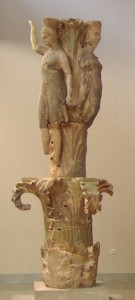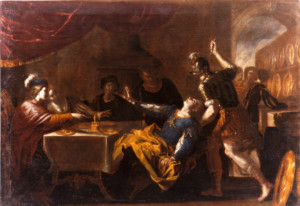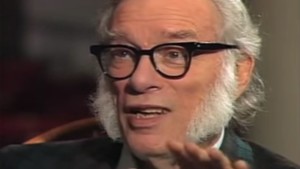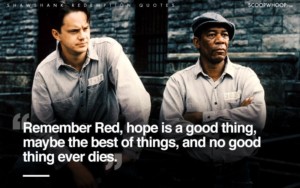Prelude 1: Danseuses de Delphes (Dancers of Delphi)
Imagine a healthy person moving slowly. How can you tell if such a person is hesitant, or dawdling, being sneaky, or being solemn? Where someone is attempting to move at a solemn pace, how might we distinguish between genuine piety, sanctimony, and lumbering?
In almost every wedding rehearsal I’ve attended, the priest or minister has had to instruct the bridal party to walk more slowly. We are not accustomed to the solemnity and dignity of well-executed ritual. What makes a hasty bride appear gauche? I suspect that it is related to what George Steiner called “ceremonials of encounter” in his important book Real Presences. As I suggested in an earlier post, all beauty promises an encounter. Do we miss this encounter because we have lost the feel for ceremony?
With these thoughts in mind, I suggest that you listen to this three-minute piece, which was inspired by the “Acanthus Column.” Debussy was familiar with a replica of this column, which depicts the ritual dance of worshippers of Apollo at the god’s shrine at Delphi. In my hearing, this dance also takes the form of a procession toward the shrine.
[image: by Ricardo André Frantz (User:Tetraktys), editing by User:Jastrow – cropped and colour-adjusted from Image:019MAD Room.jpg taken by Ricardo André Frantz, CC BY-SA 3.0, https://commons.wikimedia.org/w/index.php?curid=3370119]
Danseuses de Delphes is to be played slowly and seriously, and the opening measures are also marked “soft and sustained,” or, perhaps, “elevated.” The piece is an imagined accompaniment to a pagan liturgy. Debussy would have had no direct experience of pagan ritual, so it is safe to assume that he borrows from his experience of traditional Catholic liturgy, with its slow processions and deliberate gestures. He was an admirer of the restrained craft of Palestrina, considering it the true sacred music of the Church. This sense of a public liturgy is reinforced by an interesting performance direction at measure 11 (1:12 in the video), doux mais en dehors, which would indicate something like, “soft but outward,” meaning that the quiet dynamic is not a sign of privacy or introversion. It is a sacred hush, as the dancers move nearer the shrine.
The opening melody is played twice, at :02 and at :37. There is an important difference in the second version. After each of the slow notes of the ascending melody, an echo in the upper register is introduced, almost as if the god has heard the prayer of the dancers and is responding from a distance. At 1:12, a new theme is introduced. In this new section, the melody and echo have switched places, with the high carrying the melody, and the middle range responding. Notice too, that the two parts are now moving toward each other, toward an “encounter.” The high notes descend gently and the middle notes ascend in response. It is very much like the ascent of the Catholic priest to the altar, and his prayer that the Holy Spirit might descend upon the gifts presented there.
The arrival or encounter proper takes place at measures 15-17 (1:34-1:50). Such a beautiful moment! The mysterious music in measures 21-24 (2:13-2:38) perhaps represents the withdrawal of the god back into the sky.
Let me compare this piece to two other “liturgical” pieces. In the work of Palestrina, the careful balance of dissonance and consonance gives the listener a sense of directionality. Whenever a dissonant interval is introduced, it awakens a desire that finds its temporary resolution in the following consonance. This practice develops within a religion that arises out of a certain “problematic,” the question of sin, alienation, and suffering, which have been overcome so as to point the way to a consummation in the Kingdom of Heaven.
Debussy’s style in the first Prelude abstains from functional dissonance. He uses clusters of notes, but often in such a way as to deepen musical color rather than to suggest an unfinished desire. This suggests a religion that is a mystical projection of simpler desires, not so obviously concerned with questions of justice and suffering.
The lack of any haste or drive in the piece suits the worship of Apollo. His cult was frequently contrasted in the 19th century (most famously by Nietzsche) with the Bacchic, frenetic, emotionally suffused worship of Dionysus. Three years after the publication of Debussy’s first book of Preludes, Stravinsky shocked the world with his very different depiction of pagan liturgy, the Dionysian Rite of Spring.
The lack of haste suggests reverence and confident self-possession. How does our fast-paced society not only rob us of our personal dignity, but make it difficult for us to show reverence when it is time to pray? Does our rushing about constrain us by betraying a lack of confidence in God’s nearness? What can contemporary Catholic liturgy learn from Debussy’s imaginative scenario, which borrows from an earlier Catholic sensibility?
Might the addition of ceremony into more areas of life also introduce meaning? Many of my friends and family members who are tea drinkers attest to the importance of ceremony in brewing and drinking tea. Nearly everything in monastic life is ceremonialized. Is this a sign of a nervous, controlling culture? Or the expressed desire to encounter?
***
Note: I’ve linked Barenboim’s performance because his observance of Debussy’s instructions is the most scrupulous of the performances that I could find. However, it is always worthwhile to hear others’ interpretations. We should bear in mind that the performed piece is the best interpretation, and that my written comments are only meant to open the ear to the performers’ interpretations, and the eye to the world that inspired (in-spirited) both Debussy and his interpreters.
If you have the time, I recommend listening to each piece two or three times, perhaps in different versions.
Here is Palestrina’s most famous motet, on the text (apt, for this post) “As the hart desires after fountains, so my soul desires after You, O God.” The use of dissonance to suggest desire and resolution is clearest where the text anima mea (my soul) appears at 2:13. If you can read the music, you will see that the first syllable of anima is often tied over a barline. When the barline hits, a new note, dissonant with the one being held on anima, creating that sense of tension. Note that the resolution of anima is downward, creating a sense of rest and repose.
And here is Stravinsky’s “Dionysian” ritual. Notice how restraint is gone, and ceremony has been transformed into something fearsome, especially at 3:00. This ritual will end with human sacrifice:





